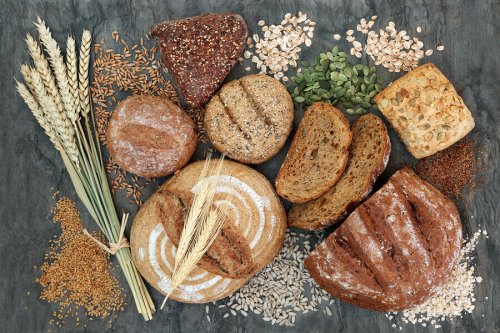Healthy Habits for a Good Metabolism

A slow metabolism can cause the accumulation of fat in your body; so it’s best to improve your habits in order to have a good metabolism. We’ll show you how to change your habits positively in this article!
Metabolism is a term that describes most of the chemical reactions that keep your body alive and functioning. However, most of the time, when talking about metabolism, reference is made to how your body burns calories and produces energy.
That is why people who eliminate calories easily and have high energy levels are characterized as having a fast metabolism. Moreover, having a good metabolism is beneficial for your health in general.
To obtain a fast metabolism, it’s essential to maintain healthy habits that allow your body to work in the best way possible. Pay attention to the tips we’ll share below and improve this aspect of your well-being with just a few changes.
Adequate habits for good metabolism
1. Sleep as needed
The sleep cycle is an aspect of great value for the metabolism to work properly. This is because, while we rest, the body repairs cells, recovers from all the effort made during the day, and regenerates the energy we lost.
Likewise, a lack of sleep has many negative effects on our metabolism. A few that stand out among them are the higher risk of being overweight, an increase in blood sugar levels, and a rise in the hunger hormone (ghrelin).
In light of this, we need to rest well every night. Not only is it necessary to have a set schedule, but also to have a healthy period of sleep. This will keep the metabolism and hormonal processes balanced.
2. Drink enough water
Drinking water constantly is a habit that provides many benefits; such as healthier skin, elimination of toxins, better oxygenation of the brain, and, of course, proper metabolical functions.
Drinking water is much better than ingesting soft drinks, sodas, or processed juices. The reason is that soft drinks worsen your metabolism’s performance due to the amount of sugar, colorings, and unhealthy chemicals they contain.

Drinking water instead of other beverages helps increase your metabolism’s speed, especially if it’s cold water. This is because your body will have to use energy to regulate the temperature of the water to match the body temperature. Thus, burning calories is much more effective.
3. Habits for a good metabolism: don’t skip meals
If you want to have a good metabolism, then avoid skipping meals as much as possible. It’s best to have a set schedule for breakfast, lunch, and dinner; in addition to the snacks between meals.
This is extremely important in light of the fact that, if your body isn’t sure of when the next meal will come, your metabolism will decrease. It’s a result of the body storing more calories as fat, rather than burning them for energy.
4. Avoid sitting for a long time
Sitting down for too long is really negative. Sitting doesn’t require the use of any muscles; on the contrary, the simple act of standing requires the involvement of several muscle groups for stability, which increases the metabolism.
Likewise, sitting down for hours is related to weight gain since fewer calories are burned. Therefore, if you work sitting down, try to spend some time standing up.
5. Eat more fiber: habits for a good metabolism
Consuming more fiber-rich foods will result in a higher calorie burn since the body works harder to break down this nutrient. This also helps fight constipation and reduces cholesterol.

If you wish to include more fiber in your diet, you can eat foods such as whole grains, oats, apples, avocados, pistachios, legumes, broccoli, raspberries, and almonds.
6. Avoid vegetable oil
Oil is much more harmful than it appears to be. Cardiovascular problems, high cholesterol, and the risk of obesity are some of its negative effects.
Instead of consuming foods prepared with vegetable oil, it’s much healthier to replace it with coconut oil or extra virgin olive oil. Coconut oil is high in medium-chain fats, which help to accelerate our metabolism.
The small habits you can change in your routine will really make a difference, not only in your metabolism. Your health, in general, will significantly improve; therefore, don’t hesitate to apply these customs.
A slow metabolism can cause the accumulation of fat in your body; so it’s best to improve your habits in order to have a good metabolism. We’ll show you how to change your habits positively in this article!
Metabolism is a term that describes most of the chemical reactions that keep your body alive and functioning. However, most of the time, when talking about metabolism, reference is made to how your body burns calories and produces energy.
That is why people who eliminate calories easily and have high energy levels are characterized as having a fast metabolism. Moreover, having a good metabolism is beneficial for your health in general.
To obtain a fast metabolism, it’s essential to maintain healthy habits that allow your body to work in the best way possible. Pay attention to the tips we’ll share below and improve this aspect of your well-being with just a few changes.
Adequate habits for good metabolism
1. Sleep as needed
The sleep cycle is an aspect of great value for the metabolism to work properly. This is because, while we rest, the body repairs cells, recovers from all the effort made during the day, and regenerates the energy we lost.
Likewise, a lack of sleep has many negative effects on our metabolism. A few that stand out among them are the higher risk of being overweight, an increase in blood sugar levels, and a rise in the hunger hormone (ghrelin).
In light of this, we need to rest well every night. Not only is it necessary to have a set schedule, but also to have a healthy period of sleep. This will keep the metabolism and hormonal processes balanced.
2. Drink enough water
Drinking water constantly is a habit that provides many benefits; such as healthier skin, elimination of toxins, better oxygenation of the brain, and, of course, proper metabolical functions.
Drinking water is much better than ingesting soft drinks, sodas, or processed juices. The reason is that soft drinks worsen your metabolism’s performance due to the amount of sugar, colorings, and unhealthy chemicals they contain.

Drinking water instead of other beverages helps increase your metabolism’s speed, especially if it’s cold water. This is because your body will have to use energy to regulate the temperature of the water to match the body temperature. Thus, burning calories is much more effective.
3. Habits for a good metabolism: don’t skip meals
If you want to have a good metabolism, then avoid skipping meals as much as possible. It’s best to have a set schedule for breakfast, lunch, and dinner; in addition to the snacks between meals.
This is extremely important in light of the fact that, if your body isn’t sure of when the next meal will come, your metabolism will decrease. It’s a result of the body storing more calories as fat, rather than burning them for energy.
4. Avoid sitting for a long time
Sitting down for too long is really negative. Sitting doesn’t require the use of any muscles; on the contrary, the simple act of standing requires the involvement of several muscle groups for stability, which increases the metabolism.
Likewise, sitting down for hours is related to weight gain since fewer calories are burned. Therefore, if you work sitting down, try to spend some time standing up.
5. Eat more fiber: habits for a good metabolism
Consuming more fiber-rich foods will result in a higher calorie burn since the body works harder to break down this nutrient. This also helps fight constipation and reduces cholesterol.

If you wish to include more fiber in your diet, you can eat foods such as whole grains, oats, apples, avocados, pistachios, legumes, broccoli, raspberries, and almonds.
6. Avoid vegetable oil
Oil is much more harmful than it appears to be. Cardiovascular problems, high cholesterol, and the risk of obesity are some of its negative effects.
Instead of consuming foods prepared with vegetable oil, it’s much healthier to replace it with coconut oil or extra virgin olive oil. Coconut oil is high in medium-chain fats, which help to accelerate our metabolism.
The small habits you can change in your routine will really make a difference, not only in your metabolism. Your health, in general, will significantly improve; therefore, don’t hesitate to apply these customs.
All cited sources were thoroughly reviewed by our team to ensure their quality, reliability, currency, and validity. The bibliography of this article was considered reliable and of academic or scientific accuracy.
- Brown, C. M., Dulloo, A. G., & Montani, J. P. (2006). Water-induced thermogenesis reconsidered: The effects of osmolality and water temperature on energy expenditure after drinking. Journal of Clinical Endocrinology and Metabolism, 91(9), 3598–3602. https://doi.org/10.1210/jc.2006-0407
- Stookey, J. J. D. (2016, January 2). Negative, null and beneficial effects of drinking water on energy intake, energy expenditure, fat oxidation and weight change in randomized trials: A qualitative review. Nutrients. MDPI AG. https://doi.org/10.3390/nu8010019
- Stookey, J. D., Constant, F., Popkin, B. M., & Gardner, C. D. (2008). Drinking water is associated with weight loss in overweight dieting women independent of diet and activity. Obesity, 16(11), 2481–2488. https://doi.org/10.1038/oby.2008.409
- Vij, V. A., & Joshi, A. (2014). Effect of excessive water intake on body weight, body mass index, body fat, and appetite of overweight female participants. Journal of Natural Science, Biology and Medicine, 5(2), 340. https://doi.org/10.4103/0976-9668.136180
- Biswas, A., Oh, P. I., Faulkner, G. E., Bajaj, R. R., Silver, M. A., Mitchell, M. S., & Alter, D. A. (2015, January 20). Sedentary time and its association with risk for disease incidence, mortality, and hospitalization in adults a systematic review and meta-analysis. Annals of Internal Medicine. American College of Physicians. https://doi.org/10.7326/M14-1651
- Scheen, A. J., Byrne, M. M., Plat, L., Leproult, R., & Van Cauter, E. (1996). Relationships between sleep quality and glucose regulation in normal humans. American Journal of Physiology, 271(2 Pt 1), E261-70.
- Chokroverty, S. (2010, February). Overview of sleep & sleep disorders. Indian Journal of Medical Research.
- Smith, M. R., Perreault, L., Wright, K. P., Eckel, R. H., Markwald, R. R., Melanson, E. L., & Higgins, J. (2013). Impact of insufficient sleep on total daily energy expenditure, food intake, and weight gain. Proceedings of the National Academy of Sciences, 110(14), 5695–5700. https://doi.org/10.1073/pnas.1216951110
- Assunção, M. L., Ferreira, H. S., Dos Santos, A. F., Cabral, C. R., & Florêncio, T. M. M. T. (2009). Effects of dietary coconut oil on the biochemical and anthropometric profiles of women presenting abdominal obesity. Lipids, 44(7), 593–601. https://doi.org/10.1007/s11745-009-3306-6
This text is provided for informational purposes only and does not replace consultation with a professional. If in doubt, consult your specialist.








